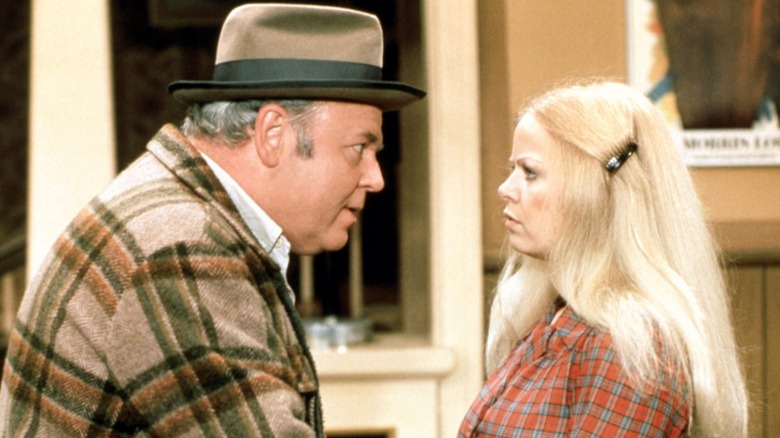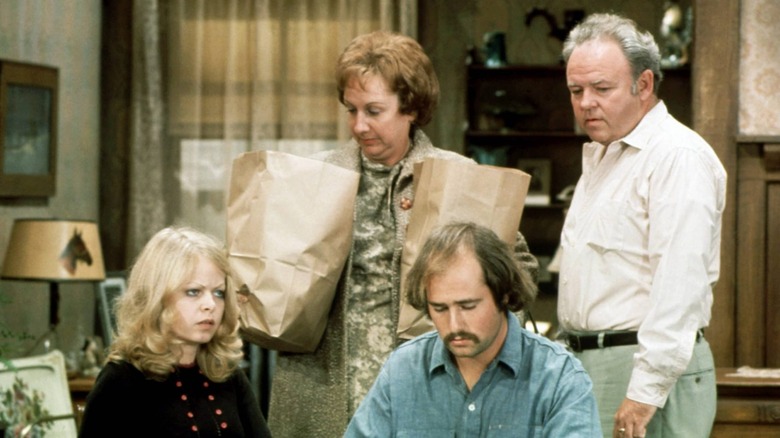All In The Family's Sally Struthers Thought Show Would Be A One-Episode Wonder
Third time may not always be the charm, but it was for "All in the Family." Following a pair of failed pilots, Norman Lear's pioneering sitcom hit the airwaves on January 12, 1971. Fittingly titled "Meet the Bunkers," the show's first episode is a pretty typical outing for Archie Bunker (Carroll O'Connor) and his kin. It's basically plotless; Archie and his son-in-law Michael/Mike (Rob Reiner) squabble over religion and politics like it's their personal hobby; Archie's daughter Gloria (Sally Struthers) is equally irritated and on the verge of tears as she tries to keep the peace between the stubborn men in her life; Archie is deservedly (and hilariously) made to look like a clown for his bigotry; and the whole thing wraps up with some unguarded earnestness, illustrating why his loved ones even put up with Archie in the first place.
Like any TV pilot, the characters aren't done cooking yet. Archie's wife Edith (Jean Stapleton), in particular, is much sassier, making cracks about their honeymoon night and taking the piss out of Archie when he makes a big hullabaloo after gripping the wrong end of a coffee pot. Likewise, Mike and Gloria can barely be bothered to keep their hands off one another within Archie's field of vision (although it was Archie's response to their horniness that caused a ruckus behind-the-scenes). Most of all, though, there's a palpable sense of timidity to the proceedings. The show's cast and crew were going where no American sitcom had gone before, and they knew it. Despite being adapted from the largely-identical British hit "Till Death Us Do Part," there was a heavy fog of doubt looming over the pilot. Would viewers applaud or riot?
To hear Struthers tell it decades later, all concerned parties believed they had a one-episode wonder on their hands.
All in the Family hit a nerve (in a good way)
To say CBS was ready to wash its hands of "All in the Family" would be putting it mildly. The network ran a disclaimer at the start of the series, warning that it "seeks to throw a humorous spotlight on our frailties, prejudices, and concerns. By making them a source of laughter, we hope to show — in a mature fashion — just how absurd they are." It was a lengthy, flop-sweat-soaked way of stating "We don't have anything to do with this show," as Reiner told American Masters in 2016.
Struthers echoed Reiner's comment that the show's cast and crew feared "All in the Family" was "too hip for the room" to live a long life in a separate interview, telling The Dispatch (via Me TV):
"When we first went on, we thought we were going to be taken off the air. We knew the show was going to infuriate some people, and make some people reel in disgust. Once the first [episode] aired we thought it was going to be our swan song. Little did we know that within a year we'd be number one."
Like Struthers noted, "All in the Family" was ultimately a game-changer that ran nine seasons and spawned a myriad of spinoffs (plus a direct sequel series with "Archie Bunker's Place"). Most importantly, it opened the door for what American sitcoms could even be now. Comedy series had taken on thorny subjects before — even "Bewitched" had an episode denouncing racism — yet it was Lear's show that gave them permission to speak plainly and do away with their playful conceits. That went double for their characters. Starting with "Meet the Bunkers," the audience's "frailties, prejudices, and concerns" were laid bare for the world to see. There was no going back, and thanks goodness for that.

